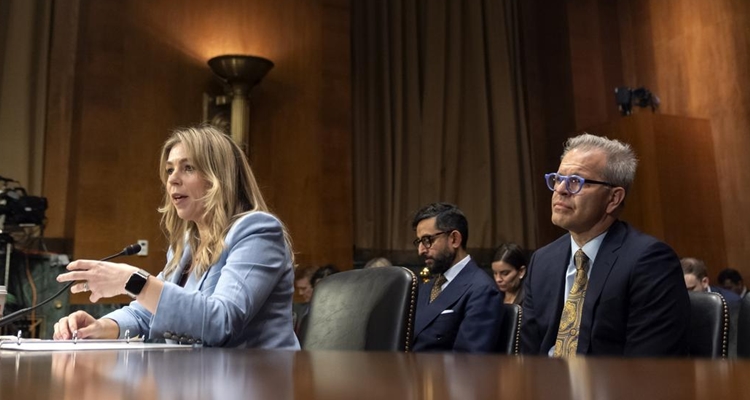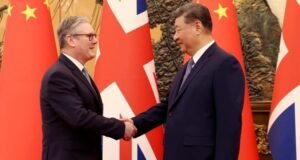
“I witnessed Meta work hand in glove with the Chinese Communist Party to construct and test custom-built censorship tools that silenced and censored their critics. When Beijing demanded that Facebook delete the account of a prominent Chinese dissident living on American soil, they did it. And then lied to Congress when asked about the incident in a Senate hearing….
“I watched as executives decided to provide the Chinese Communist Party with access to Meta user data—including that of Americans.”
Part One
This is a tale of two perspectives. One is that of former Facebook Public Policy Director Sarah Wynn-Williams.
In the opening statement of her congressional testimony in April 2025, Wynn-Williams—fired from Meta for poor performance, Meta is happy to keep telling you—said that “during my time at Meta, company executives lied about what they were doing with the Chinese Communist Party to employees, shareholders, Congress, and the American public” (Senate Judiciary Committee, April 9, 2025 [misdated “2024” in the URL]).
“Facebook’s secret mission to get into China was called Project Aldrin and was restricted to need-to-know staff. There was no bridge too far. Meta built a physical pipeline connecting the United States and China. Meta executives ignored warnings that this would provide backdoor access to the Chinese Communist Party, allowing them to intercept the personal data and private messages of American citizens. The only reason China does not currently have access to US user data through this pipeline is because Congress stepped in….
Meta’s AI for China
“Meta started briefing the Chinese Communist Party as early as 2015. These briefings focused on critical emerging technologies, including artificial intelligence. The explicit goal being to help China outcompete American companies. There’s a straight line you can draw from these briefings to the recent revelations that China is developing AI models for military use, relying on Meta’s Llama model. Meta’s internal documents describe their sales pitch for why China should allow them in the market by quote ‘help[ing] China increase global influence and promote the China Dream.’ ”
In the Q&A part of the testimony, Senator Richard Blumenthal asked: “In the documents submitted to the subcommittee, Facebook appears to have been willing to provide the data of users in Hong Kong to the Chinese government at a time when prodemocracy protestors were opposing Beijing’s crackdown. Is that impression correct? And how did Facebook treat Taiwan or Hong Kong?”
Censorship and surveillance: on
Wynn-Williams (shown above) replied that Blumenthal’s impression was correct, and that “one of the more surprising things is that as part of the censorship tool that was developed, there were virality counters. So anytime a piece of content got over 10,000 views, that would automatically trigger it being reviewed by what they called the chief editor. And what was particularly surprising is that the virality counters were not just installed but activated in Hong Kong and also in Taiwan.”
Blumenthal: “The fact is by 2018, Facebook built, it even turned on censorship and surveillance tools that it developed. It developed for Chinese security officials.”
Wynn-Williams: “It developed. And those Chinese Communist party officials tested the censorship tool and would give feedback and say, this needs to change or we need this or we need confidence that you can capture images and filter images.”
The claim, then, is that while Meta and Mark Zuckerberg were negotiating with the Chinese Communist Party—for years—about terms of setting up Facebook in China, the discussions about means of censorship were not merely hypothetical. Meta drafted censorship tools. The Party tested these censorship tools. Meta enabled the Party to obtain information about users. The Party that jails and issues bounties on speakers of speech it dislikes.
Part Two
On May 2, 2025, Simon Milner, vice president of public policy for Meta Asia Pacific, told Taiwan-based journalists that accusations that Meta “had assisted China in suppressing political speech by Taiwanese Facebook users” were “false and unfounded, as Facebook does not operate in China” (“Meta rejects claim it had a censorship deal with Beijing,” May 4, 2025).
“Facebook has never censored content from Taiwanese users at the request of the Chinese government, or shared their personal data with the Chinese government, he said, adding that the allegations stem from a former employee who was dismissed eight years ago due to poor performance….
“Separately, Meta’s Taiwan branch wrote on Facebook that it ‘solemnly denies’ allegations that the company colluded with Beijing to suppress free speech in Taiwan.”
No deal
This isn’t very persuasive. In a carefully delimited sense, the headline seems accurate enough: “Meta rejects claim it had a censorship deal with Beijing.” But Wynn-Williams also “rejects claim” that Meta had a censorship deal with Beijing. The years of Meta’s negotiations with the Chinese Communist Party did not bear ultimate fruit.
But does Meta mean to say that during those years of negotiations, the Chinese Communist Party was uninterested in whether it would be able to effectively surveil and censor Chinese users of Facebook if it allowed Facebook in China?
During her Senate testimony, Wynn-Williams and the Senators consulted more than her unaided memory.
For example, Senator Josh Hawley referred to a privacy-team email which contradicted testimony by Mark Zuckerberg “that he didn’t know what the Chinese government’s terms would be to operate Facebook and China because they were banned unquote in China. So he just had no idea. He was saying this as late as 2017, 2018. He just had no idea what the terms would be. That’s just categorically false, isn’t it?”
Wynn-Williams agreed that it was categorically false, and Hawley went on to say that the email demonstrates that Facebook was “in very regularly close contact with members of the Chinese government down to specifying how they want the censorship tools to work. They’re giving feedback on it back and forth and back and forth. And here they’ve agreed on a set of censorship tools to deploy in Hong Kong.”
Facebook and Meta
Meta spokesmen stress that Facebook does not operate in China. This is true. Facebook does not operate in China. Meta and China did not reach an agreement about Facebook. Facebook does not operate in China. Facebook does not operate in China. Facebook does not operate in China.
Wynn-Williams understands Meta to have claimed, though, that it does not operate any services, period, in China. “In fact,” says Wynn-Williams, Meta “began offering products and services in China as early as 2014. That hasn’t stopped. Their own SEC filings from last year show that China is now Meta’s second biggest market. Meanwhile, Meta’s AI model—Llama—has contributed significantly to Chinese advances in AI technologies like DeepSeek.”
So far, Milner and Meta’s responses to Wynn-Williams seem limited to deflection, ad hominem, and half-truth while ignoring the most damning and hard-to-answer details of her testimony.
Also see:
The Jamestown Foundation: China Brief: “PRC Adapts Meta’s Llama for Military and Security AI Applications”
“Although Llama [as an open-source model] comes with license agreements that expressly forbid using the software for military purposes, these have proven ineffective in preventing the PLA and affiliated researchers from doing exactly that.”
U.S. Senate Judiciary Committee: “Grassley to Zuckerberg: Stop the Secrecy, End the War on Whistleblowers”











